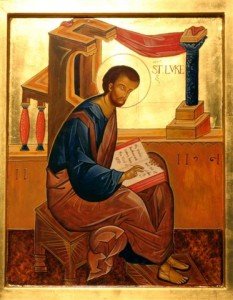 Luke’s birth story of Jesus is an overture to his gospel, but it is very different from Matthew’s. There is no mention of Herod’s plot, no star of Bethlehem, no wise men, and no flight into Egypt. They almost seem like very different stories. In Luke, Mary is the main character not Joseph, as in Matthew. There are more significant differences. It is almost as if they are telling the story of the birth of two very different people. One might ask how the stories could be so different.
Luke’s birth story of Jesus is an overture to his gospel, but it is very different from Matthew’s. There is no mention of Herod’s plot, no star of Bethlehem, no wise men, and no flight into Egypt. They almost seem like very different stories. In Luke, Mary is the main character not Joseph, as in Matthew. There are more significant differences. It is almost as if they are telling the story of the birth of two very different people. One might ask how the stories could be so different.
In Matthew, the holy family lives in Bethlehem, and Jesus is born at home. In Luke, they live in Nazareth and Jesus is born in a stable in Bethlehem, because they had to travel there for a Roman census. Matthew’s story is dark and full of foreboding, dominated by Herod’s attempt to kill Jesus. Luke’s ios full of joy. Three “hymns,” known by Christians ever since as the Benedictus, or the Magnificat, and the Nunc Dimittis, herald the coming of Jesus. This is a hymn that captures Mary’s response to the revelation of the Angel Gabriel that she would birth a son, even though she did not know man. Angels sing in the night sky to shepherd, “Glory to God in the highest.”
The Church has, for centuries, presented an account of the birth of Jesus which combines the texts of both Matthew and Luke. As we know the story, it is not a story that has been presented as a result of combining the texts of both evangelists.
Like Luke-Acts as a whole, Luke’s first two chapters really emphasize the “Spirit.” They do so five times (1:15, 35,41, 67; 2:25-27). Luke also emphasizes marginalized people more than any other gospel. Jesus is born among them in a stable, and angels appear to shepherds, who were among the outcast. Women – Elizabeth and Mary and Anna – are prominent in his story of Jesus’ birth.
As Luke and Matthew present the story of Jesus’ birth, we see that they highlighted why He championed the cause of the poor. Just as Francis, the present Bishop of Rome, highlights God’s concern for the poor and the marginalized, does Luke’s Gospel. When we think about Jesus and His ministry, we know that He was truly concerned for the poor and marginalized! We treat God in the same manner as we do the least of our brothers and sisters.
Although it is often hard for us to hear these words, we must admit that God, through Jesus, has revealed to us that how we treat the poor is important.
